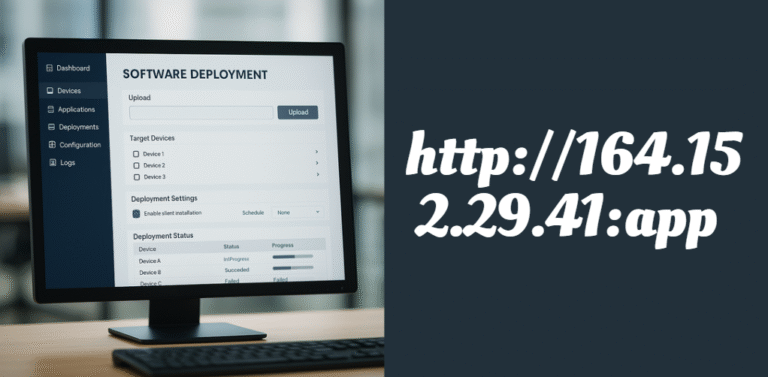Stumbled upon http://164.152.29.41:app and wondering what it is? You’re not alone. This mysterious string often pops up in logs, browser histories, or tech forums, leaving people scratching their heads. Is it safe? Is it legit? Should you ignore it—or dig deeper?
Let’s decode this IP-based URL together in plain English.
Breaking Down the URL: What Does http://164.152.29.41:app Mean?
Before we panic or get too curious, let’s understand what we’re looking at.
IP Address Explained
The 164.152.29.41 part is an IP address, like a street address but for the internet. It points directly to a server, bypassing the need for a domain like google.com.
Why It’s Not a Regular Domain
Domains are user-friendly names for websites. IP addresses? Not so much. So why would anyone use an IP address directly? Usually, it’s for internal apps, developer environments, or temporary services.
Port and Path Details
The :app bit isn’t actually a proper port like :8080 or :443. That’s what makes this even more puzzling. Typically, port numbers follow the colon, not paths. So it might be a routing alias or custom directory on that IP’s server.
Is http://164.152.29.41:app Safe to Use?
Let’s be real: clicking on random IP links is risky business.
The Privacy Factor
IP addresses don’t give you any info about who owns the server, which makes tracking and trust tough. You wouldn’t walk into a random building without signage, right?
Risks Associated With IP-Based URLs
- Phishing traps
- Malware downloads
- Credential harvesting
Unless you’re 100% sure it’s from a trusted source, avoid interacting with it.
Who Might Use This URL?
Believe it or not, URLs like these aren’t always shady.
Developers & Testers
Programmers often use IP addresses during testing phases—especially when the DNS isn’t set up yet.
Internal Teams or Agencies
Private companies, schools, or government offices may have local apps accessible only within a specific network.
How to Access http://164.152.29.41:app (If Applicable)
Step-by-Step Access Guide
If you’ve been given this link by someone in your team or IT department, here’s how to check it safely:
- Use a VPN or secure environment if you’re accessing from outside the network.
- Open an incognito tab.
- Paste the IP and hit enter.
- If it loads, you might see a login screen or dashboard.
Troubleshooting Common Issues
- Site can’t be reached? The server may be internal-only.
- Access denied? It could be whitelisted to certain IPs or credentials.
Why You’re Seeing http://164.152.29.41:app in Your Logs or History
If this URL popped up unexpectedly, it might be:
- A background call from an installed app
- A leftover dev tool link
- A malicious redirect from an ad or shady website
Always check your browsing history and installed extensions if you weren’t the one who accessed it.
Differences Between IP-Based URLs and Domain-Based URLs
Speed, Security & User Experience
- Speed: Slightly faster for internal tools (no DNS lookup).
- Security: Domains are better—can use HTTPS and certs easily.
- UX: Let’s face it—nobody wants to remember a string of numbers.
Is This Part of a Government or Private Network?
Good question. While we can’t say for certain without tools like WHOIS or traceroute, IP addresses in this range are sometimes seen in US-based institutional networks. If this URL was sent from a workplace or school, it’s probably internal.
The “App” in the Path: What Does It Indicate?
The app portion likely means this is pointing to a web application hosted on that IP address. It could be:
- A login portal
- A dashboard
- A CMS (Content Management System)
You won’t know until you access it—but again, only do so if you trust the source.
SEO & IP-Based URLs: Do They Rank?
Short answer? Nope.
Search engines don’t like indexing IP-based URLs. Google prefers:
- HTTPS over HTTP
- Named domains over raw IPs
- Secure, structured sites
If someone is using http://164.152.29.41:app for a public-facing project, they’re doing it wrong from an SEO standpoint.
How to Identify Suspicious IP URLs Like http://164.152.29.41:app
Red Flags to Watch Out For
- Links in emails that ask you to log in
- Redirects from unfamiliar ads
- Prompting you to download files
Tools for URL Reputation Check
- VirusTotal.com
- IPVoid
- Talos Intelligence
Just plug in the IP address and see what the internet says.
How to Block or Monitor http://164.152.29.41:app on Your Network
If you’re an admin and want to block or watch access to this IP:
- Add rules to your firewall.
- Set up alerts in your proxy server or router.
- Use endpoint protection software for real-time monitoring.
What to Do If You Accidentally Clicked It
Oops—clicked before thinking?
- Run a virus scan immediately.
- Clear cookies and cache.
- If you entered any credentials—change your passwords ASAP.
- Keep an eye out for weird system behavior.
Conclusion
So there you have it—http://164.152.29.41:app might seem like a random mess of characters, but it can tell you a lot if you know what to look for. Whether it’s a developer sandbox or something more sinister, treat IP-based URLs with caution and curiosity.
And always remember: just because you can click it, doesn’t mean you should.

